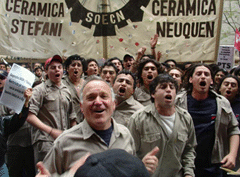.gif)
.gif)

Uncovering Muslim Identity
On July 11, 2004, Rajinder Singh Khalsa, an Indian Sikh man, was accosted by a group of men as he stood in front of his brother's restaurant wearing a turban. "Give me that dirty curtain," one of the men said. "It's not a curtain," Khalsa said. "It's a turban." "Go back to your country," another man shot back. Khalsa said: "But we are American, where should we go?" The man suggested Iran. Khalsa said: "We are not Iranian. We are not Muslim. We are Sikhs from India." He said: "Then go back to India." The men began to attack his brother. "Don't do this, he's innocent," Khalsa said. The men then turned to him. They beat him on the nose, eyes, head, everywhere, not stopping until he was unconscious on the pavement. Before they left, they took off his turban and threw it away.

An Agreement to Live: From Zanón to FaSinPat

Teach Me if You Can: An Interview with David Graeber
David Graeber is a professor of anthropology at Yale University. After becoming an activist for the anarchist cause, Graeber received disdain from a few colleagues and was soon informed that his teaching contract would not be renewed. On Nov. 2, I had lunch with Graeber at Yale.
Steven Durel: Professor, it's probable that Yale's leadership decided not to renew your contract because you are an acclaimed anarchist scholar and because you have been active with supposedly "subversive" groups on campus. How do you feel? Aren't you upset?

Eyes on US Troops in Paraguay as Bolivian Election Nears

Chavez offers Caribbean cheap oil
PUERTO LA CRUZ, Venezuela – Fresh from his confrontation with Pres. George Bush at the Summit of the Americas, Venezuelan Pres. Hugo Chavez is using his most powerful asset – oil – to challenge U.S. dominance in the Caribbean. His latest move, according to the BBC, is a regional oil initiative to provide fuel at cheaper prices to 15
